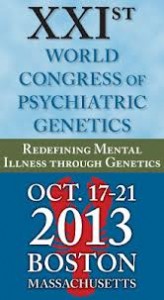Last week, the 21st annual World Congress of Psychiatric Genetics (WCPG) was held in Boston, co-chaired by CLBB faculty member Jordan Smoller, M.D., Sc.D., with Lynn DeLisi, of the Boston VA and Harvard Medical School (HMS). The conference featured leading international scholars in personal genomics, psychiatric genetics, epidemiology, psychiatry, stem cell research, bioethics, and pharmacogenetics.
Some highlights from the conference:
- Psychiatry has moved beyond it’s exceptionalism. In a sentiment ech
 oed by several others, Thomas Insel, M.D., Director of National Institute of Mental Health, observed that the mistaken belief that genetic bases of mental illness could not be studied like other disorders seems to be fading from both the medical research community as well as the general public.
oed by several others, Thomas Insel, M.D., Director of National Institute of Mental Health, observed that the mistaken belief that genetic bases of mental illness could not be studied like other disorders seems to be fading from both the medical research community as well as the general public. - Genetics is still of no use for establishing psychiatric diagnoses, despite the remarkable progress. Very few disorders have single, identifiable genetic markers. Rather, genome-wide association studies (GWAS) have revealed common genetic variants for psychiatric disorders with largely distinct phenotypic expressions (e.g., Autism and Bipolar Disorder). See also paper by Dr. Smoller, on Disorders and Borders: Psychiatric Genetics and Nosology.
- Genetics is still of little use in guiding treatment. The grand promise of the human genome project was that it would usher in an era of personalized medicine, by matching treatment protocols to a patient’s personal genetic makeup. Anil Malhotra, M.D. of Zucker Hillside Hospital, discussed pharmacogenetics and the current limitations of using existing genetics research to guide medication selection, either for maximum efficacy or to minimize side-effects. There is a glimmer of hope, with some limited progress being made in identifying the individuals most likely to react badly to certain medications.
- Getting your own personal genome is getting cheaper (and may eventually be free!). Academic advances in the field have ushered in an era of personal genomics. Multiple privately run companies are now providing genetic sequencing to the public at increasingly low costs (with some hypothesizing that the cost will eventually reach $0). A panel discussion lead by Robert Green M.D., of HMS explored how genetic information should be managed for and provided to the public. All presenters agreed that the public is eager to obtain information about their genetic data. However, the panel differed in how such data should be provided to the public.
- Paul Appelbaum, M.D. of Columbia University Medical Center, spoke about provision of information about and managing complications of consent procedures when dealing with incidental findings for research participants.
Overall, the meeting’s title — “Redefining Mental Illness through Genetics” — was clearly more aspirational than operational, and yet the meeting offered a fascinating glimpse into the possible future of psychiatry: new technologies, new nosologies, a new landscape of treatment options, and with these advances, no shortage of new and thorny ethical and legal questions.



